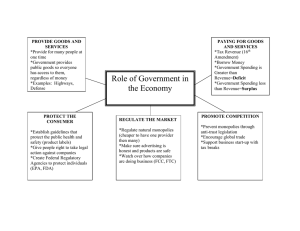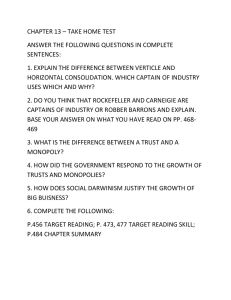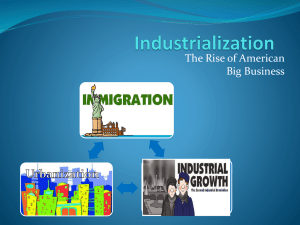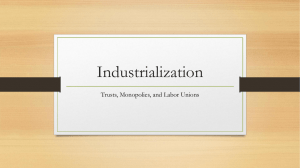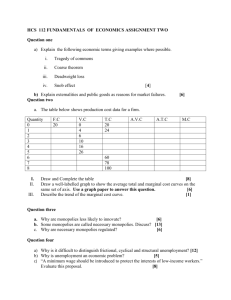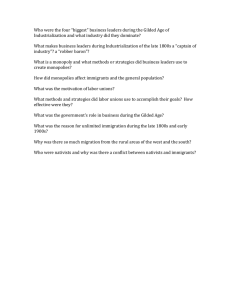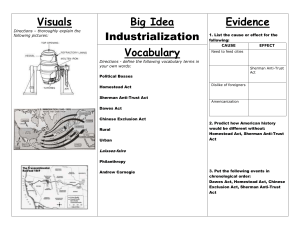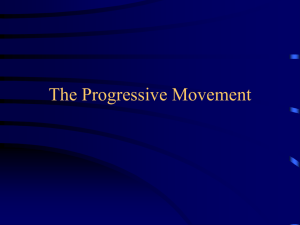Topic 5: Industrialization Unit 7: Growth of the Nation, 1865-1916
advertisement
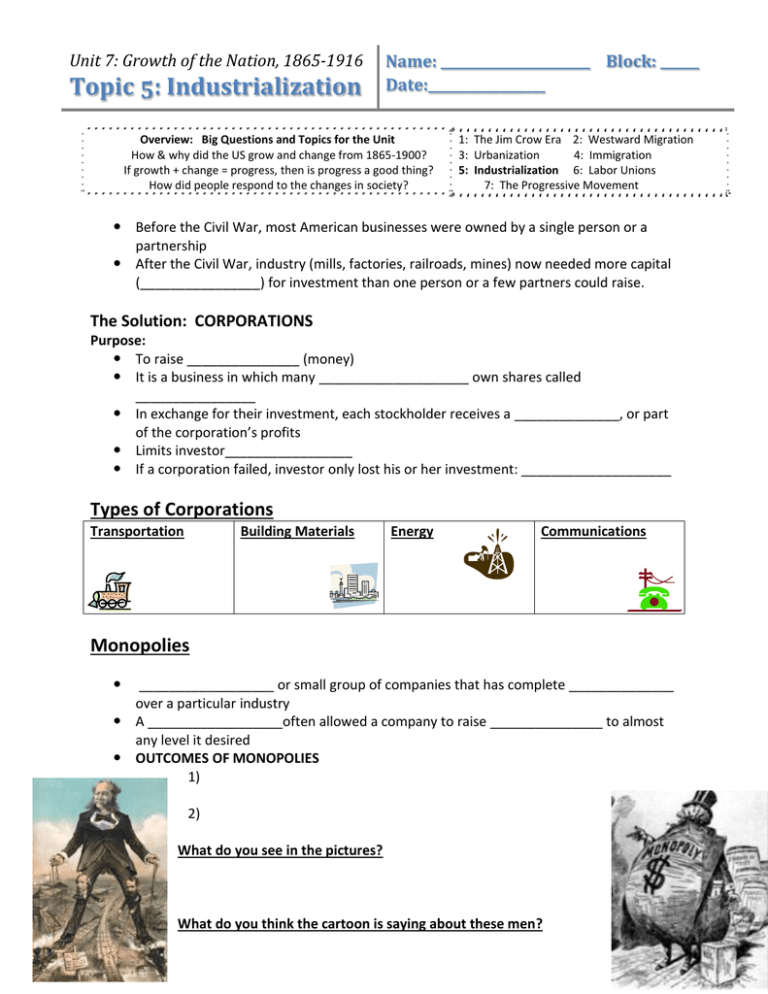
Unit 7: Growth of the Nation, 1865-1916 Topic 5: Industrialization Name: _______________________ Block: ______ Date:__________________ Overview: Big Questions and Topics for the Unit How & why did the US grow and change from 1865-1900? If growth + change = progress, then is progress a good thing? How did people respond to the changes in society? 1: The Jim Crow Era 2: Westward Migration 3: Urbanization 4: Immigration 5: Industrialization 6: Labor Unions 7: The Progressive Movement Before the Civil War, most American businesses were owned by a single person or a partnership After the Civil War, industry (mills, factories, railroads, mines) now needed more capital (________________) for investment than one person or a few partners could raise. The Solution: CORPORATIONS Purpose: To raise _______________ (money) It is a business in which many ____________________ own shares called ________________ In exchange for their investment, each stockholder receives a ______________, or part of the corporation’s profits Limits investor_________________ If a corporation failed, investor only lost his or her investment: ____________________ Types of Corporations Transportation Building Materials Energy Communications Monopolies __________________ or small group of companies that has complete ______________ over a particular industry A __________________often allowed a company to raise _______________ to almost any level it desired OUTCOMES OF MONOPOLIES 1) 2) What do you see in the pictures? What do you think the cartoon is saying about these men? Trusts Purpose: To get around government regulation of monopolies, companies combined their management into ____________ __________________ in the corporations received ______________ from the trust but lost any say in its operation A way to get around _________ regulating ____________________ Example: The _____________________________________ Industrial Leaders: (write their industry and any other notes about them) Andrew Carnegie J.P. Morgan John D. Rockefeller Cornelius Vanderbilt How did they get so powerful? __________________________________ o Controlled entire industries (__________________________________) o Got rid of competitors (horizontal integration) o Controlled ___________________ __________________________________ o Kept worker pay very ____________ with ___________ hours o Controlled ___________________and transportation costs (vertical integration) Had no government interference! LAISSEZ-FAIRE Capitalism: __________________________________ Government should not __________________ with business _______________________________________ – private individuals make the economic decisions Government is _________________________ SOCIAL DARWINSIM – was used to justify business practices Laissez-faire capitalists found justification for their practices in “Social Darwinism” Based on __________________________ theory of evolution Social Darwinists thought life was a struggle for the “________________ _____________________________________” Free-enterprise competition would lead to the ______________ businesses surviving Government regulation would let the _______ busineses survive Government programs to help the ______________ or ________________ would also let the weak survive, so they were also bad Robber Barons or Philanthropists? Those who got ________ at the expense of the ________ and the _________________ Fancy lifestyles of the rich -- showed off their wealth BUT... the Robber Barons also ___________________________________(philanthropy) Examples: Government Tries to Regulate Monopolies: Anti-Trust Laws Sherman Anti-Trust Act (________) Response to public protest against monopolies and trusts Prevented any business structure that “restrained trade” (but it didn’t define this very well) Companies got creative – formed holding companies instead Clayton Anti-Trust Act (______________) Expanded and “fixed” the Sherman Anti-Trust Act It worked to help the government “bust” or break up the big trusts Our Big Unit Question: How & why did the US grow and change from 1865-1900? If growth + change = progress, then is progress a good thing?
